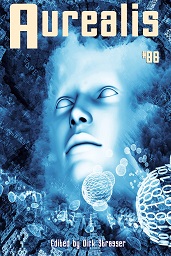“#WhatIsHendersonsCurse” by Melanie Rees
Reviewed by Clancy Weeks
I would like to say that this issue of Aurealis was uneven, but it was all too consistent for me. Each of the stories will certainly be well-received by some, but for me it was a bland mixture of unexplored possibilities.
Jezminca, Brooke, and Anika are high school aged students settling in at Jezminca’s parent-free home for a night of smoking, drinking, gossip and catty phone interaction—you know, the usual. Their little party of three is about to be invaded by a disembodied fourth, speaking to them from the twitterverse.
“#WhatIsHendersonsCurse” by Melanie Rees is straight up psychological horror ripped from the pages of a discarded Night Gallery script. It’s not bad, but taking an old plot mixed with new technology, along with liberal use of the over-worn high school girl tropes didn’t help.
Tom Dullemond, in “The Planetary Survey,” takes the oft-used diplomatic corps concept and turns it on its head. Agent Holbeck is being sent to “Neilson Prime” not so much to rescue the human colonists who have all been sedated by their machines for their “protection,” but more to solve a murder—okay, forced disassembly, of one of the local mechs by the Agency’s robotic agents.
Dullemond has a nice and timely message in this story… then proceeds to bash you over the head with it until you get the point. Much like late-night television commercials will repeat the 1-800 number until you are singing it right along with them. Nicely written, with some genuinely funny moments, but a little heavy handed.
Ashlyn Gates (I really appreciate her name being right at the beginning of the story) is a psychologist who has been called in by the government to help a little boy named Connor through a very difficult situation. His legs were amputated, along with his left arm, and he can’t speak, but those are the least of his problems. His parents were murdered, and he was kidnapped by a group of men who then, using nanotechnology, connected him to a mainframe computer to use him to break into secure systems. The worst part is the doctors have no idea how to disconnect him from the system without killing him.
“Wired” is one of those near-future SF stories that are just plausible enough to cross over into horror for me, and right up to the end I though it might go there. Unfortunately, it did not. For all Jessi Hammond‘s good writing, character development, and psychological discovery, the ending was a bit limp and unresolved.
Clancy Weeks is a composer by training, with over two-dozen published works for wind ensemble and orchestra—his most recent work, “Selene,” will premier in Houston on April 3, 2016—and an author only in his fevered imagination. Having read SF/F for nearly fifty years, he figured “What the hell, I can do that,” and has set out to prove that, well… maybe not so much. His first short story, “Zombie Like Me,” will appear in an upcoming issue of Stupefying Stories. He currently resides in Texas, but don’t hold that against him.
 Aurealis
Aurealis